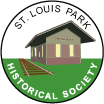In 1892, in the wink of an eye, St. Louis Park became a boom town. T.B. Walker brought in factories, built houses, a streetcar, and other infrastructure with the intent to create an industrial center wholly owned by him and his Syndicate. He built small houses for workers with families (referred to as Walker Houses) in the South Oak Hill neighborhood and large houses, predominantly in the Elmwood neighborhood (then called Center).
One of those businesses was Monitor Drill, a private company that made grain planters. Everything exploded. Although the company built some good-sized houses (called Monitor Houses), there were not enough places in town to house all of the workers needed to run this enormously successful business.
To house some of the hundreds of single men who were coming to work in the new factories, Walker (and perhaps others) built hotels and boarding houses. There were at least four hotels, all built after 1890. There are photographs of some of them, and names of proprietors associated with them, but it is difficult to match up the information. Census information can help, but only to a small extent.
1900
The closest Federal Census wasn’t until 1900, nearly eight years after the hotels were built, and locations were not given. There were, however, three men who clearly ran hotels or boarding houses:
- Henry Keller had 10 boarders – this was definitely the St. Louis Park Hotel
- John Duff had 19 boarders – this was one of the Brownlow Hotels
- Horace Haskall had 14 boarders
1910
In the 1910 Census there were many more instances where there were large numbers of boarders:
- Lizzie Summerville, age 45 and from New Brunswick, was listed as a hotelkeeper having a whopping 56 boarders.
- Four houses had 7-10 residents each, housing men who had all come from Greece.
- One house listed ten Belgians in residence.
- One rooming house had 15 boarders.
- Mrs. Dagmar Nelson ran a boarding house at 3456 Wooddale Ave. (still there).
- Many private homes had as many as 5 boarders.
1917
An article in the Minneapolis Morning Tribune about a huge fire at the Walker Building on February 3, 1917, mentions a Dan Saara, proprietor of a rooming house on the second floor of the Walker Building. 100 employees of Monitor Drill were said to be living there.
1920
The 1920 Census only showed two small lodging houses with no more than eight lodgers each. Most homes with lodgers had four at the most, and most of these were in homes with female heads of households. One interesting anomaly was that there were two railroad bunk houses, one with nine men and one with six men, all native Italians. They appear to have come to America at different times. They were section workers for the railroad. Could those bunk houses be the mysterious Skunk Houses at 6300 Cambridge?
EARLY PARK HOTELS
- The St. Louis Park/Hinkle Hotel
- The Great Northern Hotel
- The Brownlow Hotels
- The Dewey House
- The Kommers House
- Mystery Hotel
HOTEL AND BOARDING HOUSE CONDITIONS
Ben Brown remembered that hotels and boarding houses, as well as private houses, were still primitive. The outhouse was in back, or you could use the “thunder mug” under your bed. Coal and wood-burning stoves were used for heating and cooking, and lighting was by kerosene lamps. Water had to be hand-pumped from an outside well. Each room had a pitcher and bowl for shaving, but Ben couldn’t remember how the men took their (infrequent) baths.
MODERN HOTELS AND MOTELS
The following are hotels, past and present, that were built after World War II. For details on current hotels see Discover St. Louis Park‘s web page on hotels.
Marriott Minneapolis West Hotel
SpringHill Suites Minneapolis West/St. Louis Park
– See more at: http://www.discoverstlouispark.com/hotels/springhill-suites-minneapolis-westst-louis-park#sthash.W79446OZ.dpuf
SpringHill Suites Minneapolis West/St. Louis Park
– See more at: http://www.discoverstlouispark.com/hotels/springhill-suites-minneapolis-westst-louis-park#sthash.W79446OZ.dpuf
